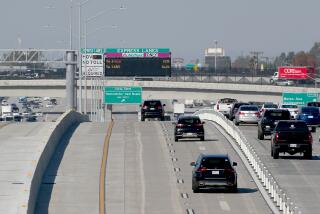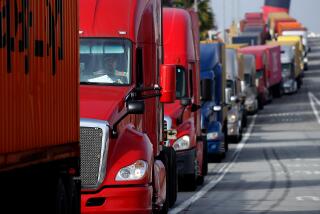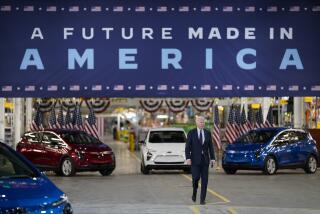New California rules require cleaner cars
California, long a national leader in cutting auto pollution, pushed the envelope further Friday when state regulators approved a suite of rules designed to cut greenhouse gas emissions from cars and put far more more pollution-free vehicles on the road in coming years.
The package of Air Resources Board regulations would require auto manufacturers to offer increasing numbers of zero or very low emission cars such as electric battery, hydrogen fuel cell and plug-in hybrid vehicles in California starting with model year 2018. By 2025, one in seven new autos sold in California, or roughly 1.4 million, would be ultra-clean, moving what is now a novelty into the mainstream.
Three years in the works, the new rules package also toughens standards for auto emissions that form smog and contribute to global warming.
“Today’s vote….represents a new chapter for clean cars in California and in the nation as a whole,” said board chair Mary Nichols.
Auto manufacturers are uneasy with some of the provisions but generally supported the package. “We know the board wants to push the automakers,” said Mike Love, national regulatory affairs manager for Toyota Motor Sales. “We said we’re willing to go along with you and do our best.”
The requirements are expected to drive up car prices. The board staff predicts that the advanced technologies needed to meet the new smog and greenhouse gas emission standards will add $1,900 to the sticker price of a new car in 2025. But that would be more than offset by $6,000 in estimated fuel costs over the life of the vehicle, according to the staff.
Zero-emission autos now make up a miniscule portion of the more than 26 million cars driven in California. There are a few hundred fuel cell cars and about 34,000 battery electric autos on the road.
“The fact that we are going to change what consumers can buy is one of the most important things we can do,” board member Ken Yeager said before the board’s 9-0 approval at the end of a two-day hearing in Los Angeles.
Manufacturers are poised to introduce a number of new electric and plug-in hybrid models. “This year two dozen or more new vehicles are going to come out in the market,” Love said. “Everyone is trying their idea for evs [electric vehicles], plug-ins.”
Nichols said there had been “a real change in attitudes on the part of auto companies that have seen the handwriting on the wall … The reality is that companies see the future is going to be in electric drivetrain vehicles. They’re moving there as fast they can.”
But whether there is strong enough demand to support robust sales remains to be seen.
“Automakers are mandated to build products that consumers are not mandated to buy,” said Gloria Bergquist, a spokeswoman for the Alliance of Automobile Manufacturers, which includes Chrysler Group LLC,Ford Motor Co. and General Motors Co. “If the electric vehicle infrastructure is not in place, consumers may be reluctant to buy these technologies.”
Kelley Blue Book market analyst Jack Nerad predicted “the added expense and lesser versatility of the ‘environmental’ vehicles” will continue to make them less desirable to consumers. “So to reach the mandated volumes, they might well have to be sold at a loss so that their manufacturers can continue to do business in California. Buyers of conventional cars will pick up the remainder of the tab.”
One of the most disputed elements of the rules package centered on a clause that in the early years of the mandate gives credits to automakers who exceed the greenhouse gas emission standards by a certain amount. Those credits would reduce the number of electric, fuel cell and plug-in hybrids the companies had to offer in California.
Jay Friedland, legislative director of Plug in America, called it “a loophole you can drive a truck through” that will undermine the 2025 goal of having ultra-clean cars make up 15% of the new vehicles sold in the state.
RELATED:
Florida legislature drops anti-videotaping language
Scientists were asked to downplay Deepwater Horizon spill rates







